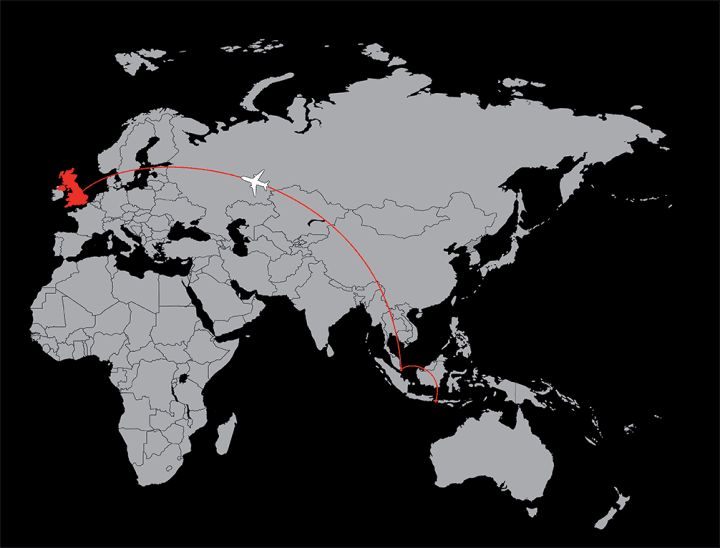Case Study
Medical Evacuation for a Digital Nomad in Bali
1 Jul 2024

Situational Analysis
The rise in digital nomads has been fueled by advances in technology, greater connectivity, and a shift towards remote work culture. This lifestyle, which allows individuals to work from anywhere in the world, has gained popularity among those seeking flexibility, adventure, and a better work-life balance. As more people embrace this way of life, the importance of adequate insurance and traveler safety has become paramount. Comprehensive health and travel insurance needs to be in place to cover potential medical emergencies and unexpected disruptions. A UK national with flexible work arrangements chose Bali, Indonesia. Unfortunately, he was struck by a vehicle while crossing a road.
Crisis24 in Action
The patient experienced fractured ribs and a fractured pelvis as a result of the accident and required immediate medical attention, including blood transfusions.
Managing Medical Resource Challenges
Crisis24's medical team, working with the treating doctor, established that the patient was stabilized but could not receive the treatment he required in the facility due to the shortage of O-negative blood in Bali. This posed a significant challenge, given the patient’s complex injuries. The Crisis24 medical team recommended to immediately evacuate the patient to a medical center of excellence with sufficient blood supplies in order for him to continue his treatment. While preparing for evacuation, arrangements were made to source blood from regional sources. In tandem, Crisis24’s medical team maintained a constant flow of information to the patient’s insurer so that they were aware of the progress of the case.
Evacuation to a Center of Medical Excellence
Crisis24 liaised with its local network of air ambulance providers and arranged for an evacuation via air ambulance to Singapore, which was monitored closely by a doctor and nurse. In Singapore, the patient was admitted to a specialized hospital and received diagnostics, blood transfusions, and a treatment plan with physical therapy and pain management. Upon recovery, the patient was repatriated to the UK with a doctor escort providing continuous medical support.

Results
Working with the patient’s insurer, Crisis24’s expertise ensured continuity of care across borders which was crucial for recovery, highlighting the importance of medical assistance support from emergency to repatriation. Quick coordination with local hospitals as well as aircraft availability with appropriate medical equipment on the flight and Crisis24’s partnerships with local hospitals and emergency services were essential to a successful outcome for the patient.

Related
Tags
Sharpen your
view of risk
Subscribe to our newsletter to receive our analysts’ latest insights in your inbox every week.
Intelligence & Insights
Intelligence
Worth Gathering
Employing a team of 200+ analysts around the world, Crisis24 is the only source you need for on-point, actionable insights on any risk-related topic.

Intelligence Analysis
China’s New Digital Measures Likely to Affect International Businesses and Travelers
China is likely to implement additional digital measures that could further exacerbate operational unpredictability for international businesses and travelers.
February 24, 2026

Intelligence Analysis
Six Countries within WHO European Region Lose Measles Elimination Status
On Jan. 26, 2026, the WHO announced that Armenia, Austria, Azerbaijan, Spain, the UK, and Uzbekistan had lost their measles elimination status.
By Robyn Mazriel
February 23, 2026

Intelligence Analysis
Ground Transport and Flight Disruptions Persist in Parts of Mexico Amid Violence
Violence linked to CJNG operations continues to disrupt transport and travel across parts of Mexico. Learn how evolving security risks affect personnel and operations.
February 23, 2026

Intelligence Analysis
Terrorism Outlook 2026: Threats, Tactics, and Global Implications
In 2026, terrorism will be marked by consolidation of influence and operational capacity across vulnerable environments rather than global resurgence.
By Crisis24 Global Intelligence Team
February 19, 2026



